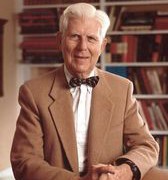2004 – Aaron Beck
A psychiatrist considered to be the founder of cognitive therapy — and credited with its approach of helping people learn techniques to help themselves — has won the 2004 University of Louisville Grawemeyer Award for Psychology.
The fourth awarding of the $200,000 prize for outstanding ideas in the field of psychology is to Aaron Beck, who developed the system of psychotherapy in the 1960s in a radical departure from the traditional Freudian theories, analysis and behavioral approaches of that time.
About Aaron Beck
Aaron Beck, considered the founder of cognitive therapy, is university professor emeritus of psychiatry at the University of Pennsylvania’s School of Medicine and president of the Beck Institute for Cognitive Therapy and Research in suburban Philadelphia.
The Providence, R.I., native earned his medical degree in 1946 from Yale University and his bachelor’s degree in 1942 from Brown University; Beck also has honorary doctorates from Brown and Assumption College.
After his residencies and fellowship, he served in the military as assistant chief of neuropsychiatry at Valley Forge Army Hospital before becoming an instructor in 1954 at University of Pennsylvania. He has been professor emeritus at Pennsylvania since 1992 and also has been adjunct professor at Temple University and University of Medicine and Dentistry of New Jersey. He served as visiting scientist at Oxford University in 1986.
Beck has written or co-authored 17 books, including the recent “Prisoners of Hate: The Cognitive Basis of Anger, Hostility and Violence.” His others deal with topics such as suicide prevention, depression, personality disorders, anxiety, bipolar disorder and substance abuse and how cognitive therapy relates to each. He also has served on editorial boards of several academic journals and has published more than 450 articles.
Besides his publications, Beck has developed several scales for evaluating patients with tendencies toward depression, anxiety and suicide. The assessment tools and therapeutic techniques are used widely in research and clinical settings.
For decades the renowned mental health scientist has directed funded research into cognitive therapy and the various disorders for which it is effective. The National Institute of Mental Health and the Centers for Disease Control have funded his work into therapy and assessment of disorders; recent work has focused on using cognitive therapy to reduce suicide attempts. He also directed an international group of scientists testing cognitive therapy for schizophrenia.
A member of the Institute of Medicine, Beck has received that organization’s Sarnat Award and many other honors, including research awards from both the American Psychological Association and the American Psychiatric Association and the 2001 Heinz Award in the Human Condition from the Heinz Family Foundation.
His nonprofit Beck Institute for Cognitive Therapy and Research was founded in 1994 to provide therapy and research opportunities as well as an international training site for cognitive therapists from beginning to advanced levels. Beck is president, and his daughter Judith Beck is its director; she is a clinical associate professor at the University of Pennsylvania.


